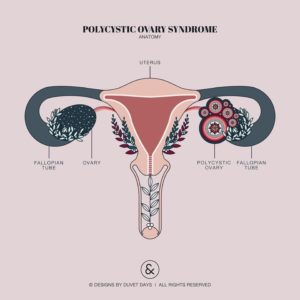I’m Not Ovary Acting: Polycystic Ovarian Syndrome and Infertility

What is PCOS?
Polycystic ovary syndrome (PCOS), is a common health problem caused by an imbalance of female sex hormones. The hormonal imbalance creates problems in the ovaries. The ovaries make the egg that is released each month as part of a healthy menstrual cycle. With PCOS, the egg may not develop as it should or it may not be released during ovulation as it should be.
PCOS can cause missed or irregular menstrual periods. Irregular periods can lead to:
- Infertility (inability to get pregnant). In fact, PCOS is one of the most common causes of infertility in women.
- Development of cysts (small fluid-filled sacs) in the ovaries
Some of the most common signs of PCOS include:
- Irregular periods that come every few months, not at all, or too frequently
- Extra hair on the face or other parts of the body
- Acne
- Weight gain and/or trouble losing weight
- Patches of dark skin on the back of the neck and other areas
Can PCOS affect my fertility?
In short yes it can! Having PCOS though does not mean you can’t get pregnant. PCOS is one of the most common, but treatable, causes of infertility in women. In women with PCOS, the hormonal imbalance interferes with the growth and release of eggs from the ovaries (ovulation). If you don’t ovulate, you can’t get pregnant. To understand how PCOS affects your fertility lets compare a “normal” menstrual cycle vs. a menstrual cycle of a women with PCOS.
Key Terms:
Luteinizing Hormone (LH)
Follicular Stimulating Hormone (FSH)
Normal Cycle:
- The menstrual cycle starts when the brain sends LH and FSH to the ovaries. FSH is responsible for stimulating follicles (immature eggs) to grow and release estrogen which triggers a surge of LH. This big surge of LH is the signal that causes the release a mature egg (ovulation)
- The egg travels down the fallopian tube and into the uterus. Progesterone is released from the follicle that once housed the egg causing the lining of the uterus to thicken.
- If the egg isn’t fertilized, the lining of the uterus is shed. This is a menstrual period.
- After the menstrual period, the cycle begins all over again.
PCOS Cycle:
- The Pituitary gland produced a higher level of LH in comparison to FSH. This results in the formation of several follicles that fail to mature properly (cysts).
- With this hormonal imbalance the LH surge required to release the egg does not happen due to the high levels of LH at the beginning of the cycle.
- High LH levels also result in the production of excess “male” hormones called androgens which inhibit ovulation.
- When ovulation doesn’t take place consistently the bodies production of progesterone will be low making successful implantation much more difficult if conception does happen.
With the presence of these hormonal imbalances, women with PCOS may have trouble conceiving due to irregular periods and not ovulating regularly.
What can be done?
There is no known cure, but there are ways to better manage the symptoms of PCOS and help increase the chances of conceiving. Treatment for PCOS starts with lifestyle changes like clean, healthy eating and exercise. A few studies have found that 30 minutes of moderate-intensity exercise at least three days a week can help women with PCOS lose weight. Losing just 5 to 10 percent of your body weight if you are overweight can help regulate your menstrual cycle and improve PCOS symptoms.
Osteopathic care through the use of Mercier Therapy has also been found to help to regulate your menstrual cycle and increase the chances of conception. You may not have adequate blood flow to your pelvic organs. Maybe many of the little cystic masses have ruptured into your pelvic cavity causing scar tissue to form. Scar tissue puts all of your involved organs into a holding pattern of restriction. With the use of Mercier Therapy we will reintroduce organ movement and proper blood flow for optimal organ function.
If you have any questions about how Mercier Therapy can help you regulate your menses and increase you’re chances of conceiving click here to book an assessment! I would love to chat!
– Nathan Lambert, DOMP
Leave a Reply